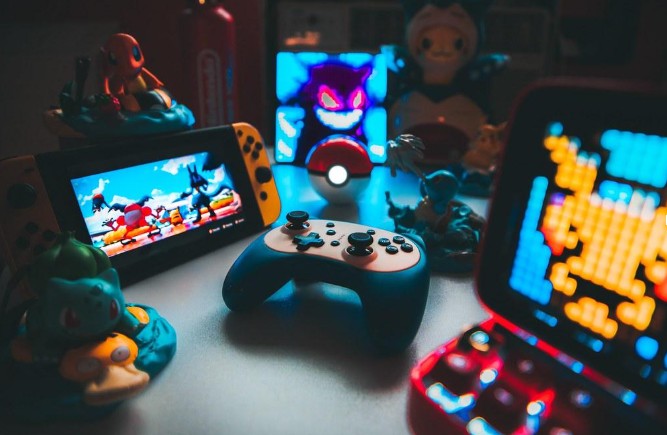
The gaming industry has experienced significant growth over the past decade, with global revenues reaching $187 billion in 2023. However, the industry now faces challenges such as layoffs and underperforming titles. Amid this landscape, blockchain technology is emerging as a potential disruptor Bitcoin price analysis shows the cryptocurrency’s volatility, but blockchain’s impact extends far beyond.
By enabling true ownership of digital assets, creating new economic models like play-to-earn, and fostering decentralized gaming ecosystems, blockchain is poised to revolutionize gaming. This technology could redefine how games are played, assets are owned, and value is created and distributed within the gaming industry.
The Rise of NFTs and True Ownership
Non-fungible tokens are revolutionizing in-game asset ownership by providing players with genuine, verifiable ownership of unique digital items. Unlike traditional in-game assets, NFTs are stored on a blockchain, ensuring transparency, security, and immutability. This means players can buy, sell, and trade their NFT assets just as they would physical goods, with the blockchain serving as a decentralized ledger that records ownership.
The rise of NFTs in gaming enables a new level of player empowerment and control over their digital possessions. Early blockchain games like CryptoKitties pioneered the use of NFTs, allowing players to collect, breed, and trade unique digital cats. Each CryptoKitty is a one-of-a-kind NFT with its own set of attributes, showcasing the potential for NFTs to create scarcity and value within gaming ecosystems.
As more games adopt NFTs, players can truly own their in-game assets, opening up new possibilities for trading, collecting, and even earning real-world value from their virtual items. This shift towards true ownership marks a significant departure from traditional gaming models, where in-game assets are typically controlled by game developers and have no value outside the game itself.
Play-to-Earn and New Economic Models
The play-to-earn model is transforming the gaming landscape by allowing players to earn cryptocurrencies or NFTs with real-world value simply by playing the game. In this innovative model, players are rewarded for their time, skill, and engagement, creating new incentives and revenue streams that were previously unavailable in traditional gaming.
Successful play-to-earn games like Axie Infinity have showcased the potential of this new economic model. In Axie Infinity, players collect, battle, and breed unique NFT creatures called Axies. By participating in the game’s economy, players can earn the game’s native cryptocurrency, AXS, which can be traded on exchanges for other cryptocurrencies or fiat money.
The rise of play-to-earn games has significant implications for the gaming industry and beyond. As players realize they can earn real income by playing games, it could change the way people view gaming as a hobby or even a job. This new economic model could attract a wider audience to gaming and create new opportunities for players in developing countries to earn a living through play.
Moreover, the play-to-earn model has the potential to create entirely new gaming economies, with players taking on roles as investors, traders, and entrepreneurs within these virtual worlds. As the popularity of play-to-earn games grows, it could lead to a paradigm shift in how we think about work, leisure, and the digital economy.
Challenges and Future Outlook
While blockchain gaming presents exciting opportunities, it also faces challenges such as scalability issues, complex user experiences, and regulatory uncertainty. As the technology matures, solutions like layer-2 scaling and more user-friendly interfaces are being developed to address these limitations.
Looking ahead, industry experts predict that AAA games will increasingly integrate blockchain technology, leading to mainstream adoption of crypto-gaming. This shift could create a more player-centric and economically vibrant gaming landscape, where players have greater control over their assets and can participate in new forms of value creation. As blockchain reshapes the gaming industry, it has the potential to unlock new levels of innovation, empowerment, and economic opportunity for players worldwide.
The Future Is Blockchain
The future of gaming is on the brink of a profound change, with blockchain technology poised to redefine the industry in ways that were once unimaginable. By enabling true ownership of digital assets, creating new economic models, and fostering decentralized gaming ecosystems, blockchain is challenging the very foundations of traditional gaming.
As we stand at the precipice of this blockchain-driven revolution, it is clear that the gaming industry is about to embark on a thrilling journey filled with endless possibilities. While there are undoubtedly challenges to overcome, such as scalability, user experience, and regulatory hurdles, the rapid pace of innovation and the growing enthusiasm within the gaming community suggest that these obstacles will be surmounted.

In the not-too-distant future, we can envision a gaming landscape where AAA titles are built on the blockchain, and crypto-gaming has become the norm. Players will have unparalleled control over their digital assets, with the ability to trade, sell, and even earn a living through their gaming experiences. This player-centric, economically vibrant ecosystem will unlock new levels of creativity, engagement, and value creation, blurring the lines between the virtual and real worlds.
As we look ahead to the exciting possibilities that blockchain technology holds for the future of gaming, one thing is certain: the games we play, the way we play them, and the value we derive from them will never be the same again. The blockchain gaming revolution is upon us, and it promises to be an exhilarating ride.












